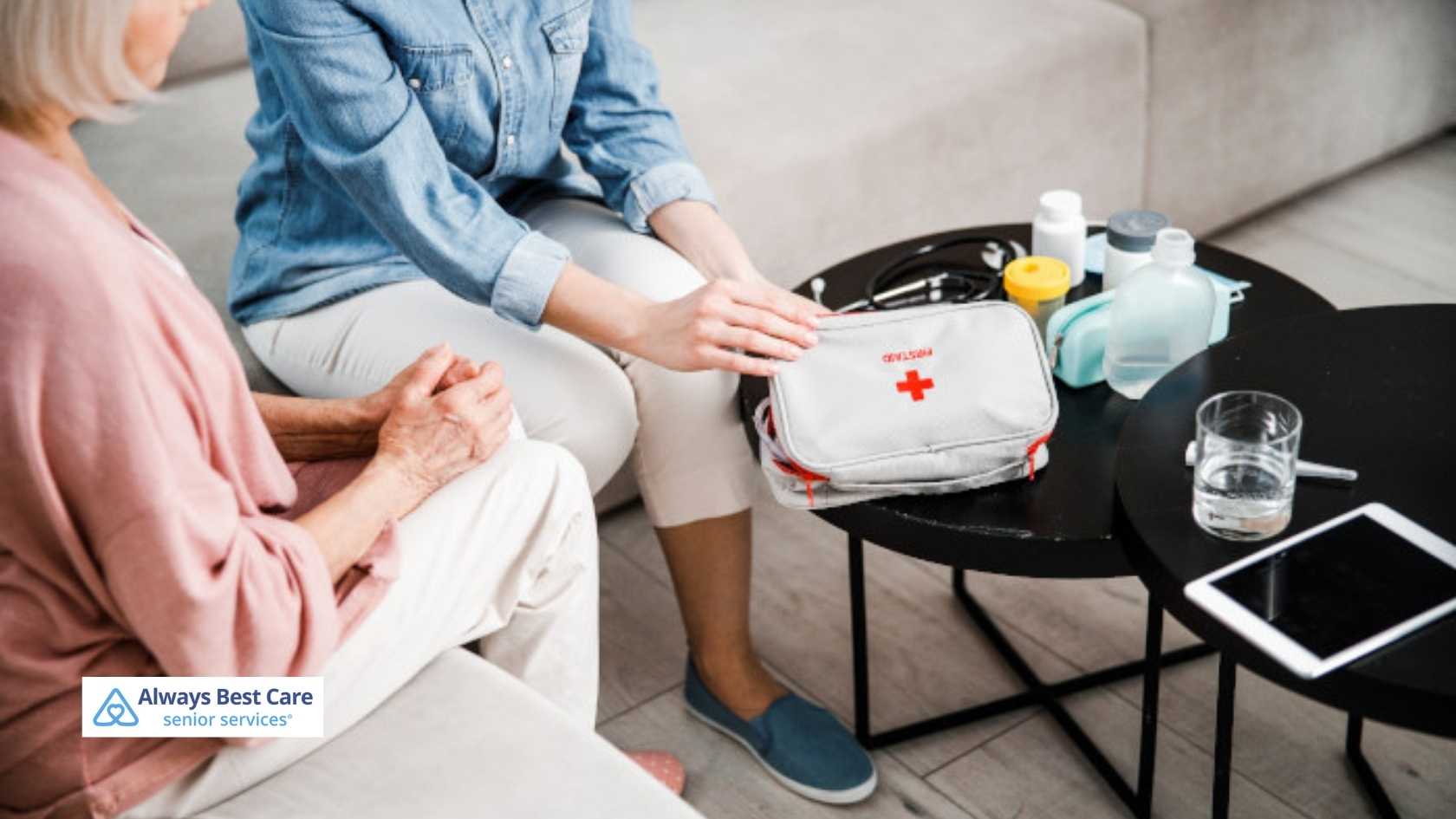Navigating Hurricane Season: Emergency Preparedness Tips for Shalimar Seniors

Hurricane season can be daunting, but don’t worry – we’ve got your back here at Always Best Care of Shalimar. Let’s chat about how to stay safe and prepared when those big storms come rolling in.
Table of Contents
Develop a Comprehensive Evacuation Plan
First things first, let’s talk about having a solid evacuation plan. Knowing where you’ll go if things get dicey is important. You may have family or friends in safer areas who’d be happy to host you.
Or you could scope out some emergency shelters nearby. Either way, ensure you have a few options up your sleeve. And hey, if you need a hand getting around, we at Always Best Care can help you figure out your senior transportation ahead of time. No one wants to be scrambling at the last minute!
Map Out Evacuation Routes
Now, about those evacuation routes – it’s a good idea to know a few different ways to get out of dodge. Keep a good old-fashioned paper map handy if your phone takes a vacation during the storm. And why not take those routes for a test drive when the weather’s nice? It’ll help you feel more comfortable if you ever need to use them for real.
Tips for Safe Evacuation with Pets and Loved Ones
Preparation is key when evacuating with pets and loved ones during a hurricane. Here are some expanded tips to help you stay safe:
• Pet identification: Ensure your pets have up-to-date ID tags on their collars. Consider getting your pets microchipped, as this can greatly increase the chances of reuniting with them if you get separated.
• Comfortable carriers: Get your pets used to their carriers before an emergency. Leave the carrier in places your pet visits frequently, and try feeding them treats near or inside it. This will help reduce stress when it’s time to evacuate.
• Pack essentials: Prepare an emergency kit for your pets that includes:
- A week’s worth of food and water
- Any necessary medications
- Medical and vaccination records
- A sturdy leash or harness
- Litter and litter box for cats
- Favorite toys or blankets to help keep them calm.
• Plan your destination: Not all shelters accept pets, so research pet-friendly options in advance. This might include pet-friendly hotels along your evacuation route or arranging to stay with friends or family who can accommodate your pets.
• Practice evacuations: Take your pets on practice drives in your evacuation vehicle. This can help them get used to traveling and make evacuation less stressful.
• Meeting spot: If you and your family are separated during the evacuation, designate a meeting place. Make sure everyone knows the location and can contact each other.
• Stay calm: Pets can sense our emotions, so try to remain calm during evacuation. Speak to your pets in a soothing voice to help keep them relaxed.
Keeping Important Documents Safe and Accessible
Keeping your important documents safe is a big deal. Grab a waterproof container and toss in your ID, insurance papers, and medical records. Digital copies on a secure flash drive might not hurt, either. Oh, and don’t forget to jot down your meds and dosages—that information can be a lifesaver.
Securing Emergency Contacts and Communication Methods
It’s all about having a plan for staying in touch during an emergency. Set up a phone tree with your loved ones so everyone knows who’s calling. Why not download some of those nifty communication apps that work without cell service? A battery-powered radio is a great backup, too—it’s old school, but it gets the job done!
How to Build a Tailored Emergency Kit for Seniors
Let’s talk about building an emergency kit that’s just right for aging seniors! Here at Always Best Care, we know how important it is to be prepared. So, let’s break down what you need in your kit:
• Water and food: Pack enough for at least a week. Aim for one gallon of water per person per day. Don’t forget non-perishable, easy-to-prepare food items.
• Medications: Include a 7-day supply of all your prescription and over-the-counter medications. Also, keep a list of your medications and dosages in the kit.
• Medical supplies: If you use hearing aids, pack extra batteries. Include spare glasses, contact lenses, or any other medical equipment you rely on.
• First aid kit: A complete first aid kit is a must-have. Make sure it’s well-stocked and includes a manual.
• Lighting and communication: Pack a flashlight, extra batteries, and a battery-powered or hand-crank radio. This will help you stay informed during power outages.
• Personal care items: Don’t forget essentials like incontinence supplies, sanitation items, and hygiene products.
• Important documents: Keep copies of your ID, insurance cards, and medical information in a waterproof container.
• Comfort items: Pack a change of clothes, sturdy shoes, and a blanket or sleeping bag.
Staying Informed during Hurricane Season
Staying informed is crucial during hurricane season. Monitor local news and weather reports. To make this easier, we can help you set up weather apps on your phone or tablet.
Trusted Resources for Weather Updates
For the most up-to-date information, visit the National Hurricane Center’s website or tune in to NOAA Weather Radio. These are great resources for tracking storms and getting official updates.
Signing Up for Local Alerts and Notifications
Make sure you’re signed up for local emergency alerts. In Shalimar, you can register for AlertOkaloosa at alertokaloosa.com. We’d be happy to help you set it up.
Safeguard Your Home Before the Storm
When safeguarding your home before a hurricane, we at Always Best Care of Shalimar want to ensure you’re well-prepared. Here’s a more detailed look at what you can do to protect your property:
• Secure windows and doors: If you have storm shutters, now’s the time to put them up. No shutters? No problem! You can board up windows with plywood. Don’t forget to secure your garage door, too – it’s often the most vulnerable part of your home.
• Clear your yard: Bring in all outdoor furniture, decorations, and anything else that could become a projectile in high winds. This includes potted plants, bird feeders, and even your grill.
• Trim trees and shrubs: Cut back branches that could fall on your house or power lines. If you have dead or damaged trees, it might be time to remove them entirely.
• Clean gutters and downspouts: Make sure your gutters are clear of debris so water can flow freely. This helps prevent water damage to your roof and walls.
• Check your roof: Look for loose or damaged shingles and have them repaired. A sturdy roof is your first line of defense against heavy rain.
• Prepare for flooding: If you live in a flood-prone area, consider using sandbags to create a barrier around your home. If possible, move valuable items to higher ground.
• Document your belongings: Take photos or videos of your home and valuable possessions. This can be helpful for insurance purposes if you need to file a claim later.
• Review your insurance: Make sure your homeowner’s or renter’s insurance is current and that you understand what’s covered.
Remember, your safety is the top priority. If any of these tasks seem too challenging or dangerous, feel free to ask for help. We’re here to lend a hand or connect you with trusted professionals who can assist with home preparations.
Techniques for Managing Stress During Emergencies
We at Always Best Care of Shalimar want to ensure that you are equipped with effective techniques for managing stress during emergencies like hurricanes.
When you feel anxious, try slow, deep breathing. Inhale deeply through your nose, hold for a few seconds, and exhale slowly. This simple technique can help regulate your body’s stress response and clear your mind.
Reach out to family and friends. Talking about your feelings with someone you trust can be incredibly comforting and help you process the situation.
Break down the situation into manageable steps. Instead of worrying about everything, concentrate on one task at a time, like checking your emergency kit or securing important documents.
While staying informed is important, constant exposure to news can increase anxiety. Set specific times to check for updates and avoid continuous watching.
Try to stick to regular meal and sleep schedules as much as possible. Include activities you enjoy to give yourself something positive to look forward to.
Eat healthy foods, avoid alcohol and drugs, and try to get some exercise, even if it’s just a short walk or some stretching.
Remind yourself of your strength with phrases like “I can handle this” or “I am prepared.” This can boost your confidence in challenging situations.
Year-Round Preparedness and Safety for Shalimar Seniors With ABC’s Support!
At Always Best Care of Shalimar, we’re here for you all year round. We can help you review and update your emergency plan, maintain your emergency kit, and provide companionship during stressful times.
Remember, being prepared is key to staying safe during hurricane season. With a little planning and our support, you’ve got this!
Contact Always Best Care of Shalimar at (850) 797-8710 to learn more and schedule your free consultation.





